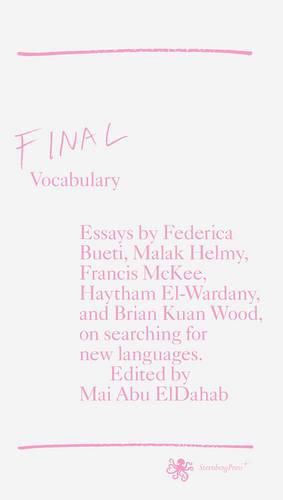Readings Newsletter
Become a Readings Member to make your shopping experience even easier.
Sign in or sign up for free!
You’re not far away from qualifying for FREE standard shipping within Australia
You’ve qualified for FREE standard shipping within Australia
The cart is loading…






Five essays that take an intimate look at what language’s role is in moments of dramatic change, and how to find meaning for artistic practices in these transformative conditions. Taking its cue from the aftermath of the events of the Egyptian Revolution in 2011, Final Vocabulary doesn’t provide answers as much as it captures the spirit of the moment of searching in which the writers find themselves. The book was developed out of a live conversation at an event called The Informal Meeting that took place in Leuven in January 2015, where participants were asked: Our histories and references are often in a different language (abstract or actual) than we use ourselves, what tools do you think are or might be useful to help you trust your own memories and narratives? What, if anything, do you think we might borrow from art to experiment with language in different situations? In English and Arabic.
Copublished with Mophradat
Contributors Federica Bueti, Malak Helmy, Francis McKee, Haytham El Wardany, Brian Kuan Wood
$9.00 standard shipping within Australia
FREE standard shipping within Australia for orders over $100.00
Express & International shipping calculated at checkout
Five essays that take an intimate look at what language’s role is in moments of dramatic change, and how to find meaning for artistic practices in these transformative conditions. Taking its cue from the aftermath of the events of the Egyptian Revolution in 2011, Final Vocabulary doesn’t provide answers as much as it captures the spirit of the moment of searching in which the writers find themselves. The book was developed out of a live conversation at an event called The Informal Meeting that took place in Leuven in January 2015, where participants were asked: Our histories and references are often in a different language (abstract or actual) than we use ourselves, what tools do you think are or might be useful to help you trust your own memories and narratives? What, if anything, do you think we might borrow from art to experiment with language in different situations? In English and Arabic.
Copublished with Mophradat
Contributors Federica Bueti, Malak Helmy, Francis McKee, Haytham El Wardany, Brian Kuan Wood